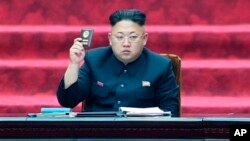BEIJING —
North Korea says it could soon carry out its fourth nuclear test. If it does, analysts say China is likely to support tougher sanctions at the United Nations, and even carry out some actions of its own. It is not clear whether Beijing has enough leverage to deter the North's leader Kim Jong Un from taking other actions to forward his nuclear ambitions.
On Saturday, North Korea renewed its threat to carry out its fourth nuclear test.
Statements published in state media say Pyongyang’s resolve to further its nuclear plans is a matter of protecting its sovereignty and dignity. North Korea says it is facing threats from the United States and South Korea.
It is not clear how close Pyongyang is to carrying out the test. South Korea’s defense ministry says preparations for the test appear to be nearing completion.
Alexander Neill, a senior fellow for Asian security with the Shangri-La Dialogue, said, “I think the weight of evidence seems to suggest that a test is going to happen quite soon.”
Complex relationship
China has long been one of North Korea’s few friends and many believe Beijing is the one country that can sway Pyongyang. Following last year’s nuclear test, Beijing began taking a tougher approach, temporarily halting tourism and terminating dealings between the Bank of China and a key North Korean bank.
Political scientist Shi Yinhong of Beijing’s Renmin University said a fourth test would mean tougher measures. “China will shape with other permanent members U.N. sanction resolutions, and China will probably launch its own unilateral and national sanctions, including some measures which China has not taken in the past. This could represent China’s advance of it’s hard response to North Korea’s very dangerous actions,” said Shi.
Neill said there is a range of measures China could take, but limits to what Beijing can do. “China could halt food aid to the North, it could halt fuel supplies and it could put pressure on the North in a number of other areas, particularly things like Chinese investment in the North. But, China ultimately needs to strategically balance this by maintaining the North as a buffer zone on the Korean peninsula,” he said.
Beijing also is growing increasingly challenged by the unpredictability of Kim Jong Un, and that has further frayed ties and led to a toughening of China’s stance.
“I think that as a statesman and political leader, Xi Jinping has often behaved as more determined and more resolute," said Renmin University’s Shi. "Also, I think that Kim Jong Un, the son, unlike his father Kim Jong Il is more volatile, more adventurous and more even unfriendly toward China, so I think that this kind of a situation will make any of China’s leaders take some [steps] that are at least a little harder.”
Last year, Kim executed his uncle, a man who favored China’s economic model and played a key role in maintaining relations between the two countries.
Since he assumed power, Kim has yet to visit China. But South Korea’s president has met with China's leader several times, and next month Xi is expected to travel to Seoul.
On Saturday, North Korea renewed its threat to carry out its fourth nuclear test.
Statements published in state media say Pyongyang’s resolve to further its nuclear plans is a matter of protecting its sovereignty and dignity. North Korea says it is facing threats from the United States and South Korea.
It is not clear how close Pyongyang is to carrying out the test. South Korea’s defense ministry says preparations for the test appear to be nearing completion.
Alexander Neill, a senior fellow for Asian security with the Shangri-La Dialogue, said, “I think the weight of evidence seems to suggest that a test is going to happen quite soon.”
Complex relationship
China has long been one of North Korea’s few friends and many believe Beijing is the one country that can sway Pyongyang. Following last year’s nuclear test, Beijing began taking a tougher approach, temporarily halting tourism and terminating dealings between the Bank of China and a key North Korean bank.
Political scientist Shi Yinhong of Beijing’s Renmin University said a fourth test would mean tougher measures. “China will shape with other permanent members U.N. sanction resolutions, and China will probably launch its own unilateral and national sanctions, including some measures which China has not taken in the past. This could represent China’s advance of it’s hard response to North Korea’s very dangerous actions,” said Shi.
Neill said there is a range of measures China could take, but limits to what Beijing can do. “China could halt food aid to the North, it could halt fuel supplies and it could put pressure on the North in a number of other areas, particularly things like Chinese investment in the North. But, China ultimately needs to strategically balance this by maintaining the North as a buffer zone on the Korean peninsula,” he said.
Beijing also is growing increasingly challenged by the unpredictability of Kim Jong Un, and that has further frayed ties and led to a toughening of China’s stance.
“I think that as a statesman and political leader, Xi Jinping has often behaved as more determined and more resolute," said Renmin University’s Shi. "Also, I think that Kim Jong Un, the son, unlike his father Kim Jong Il is more volatile, more adventurous and more even unfriendly toward China, so I think that this kind of a situation will make any of China’s leaders take some [steps] that are at least a little harder.”
Last year, Kim executed his uncle, a man who favored China’s economic model and played a key role in maintaining relations between the two countries.
Since he assumed power, Kim has yet to visit China. But South Korea’s president has met with China's leader several times, and next month Xi is expected to travel to Seoul.




